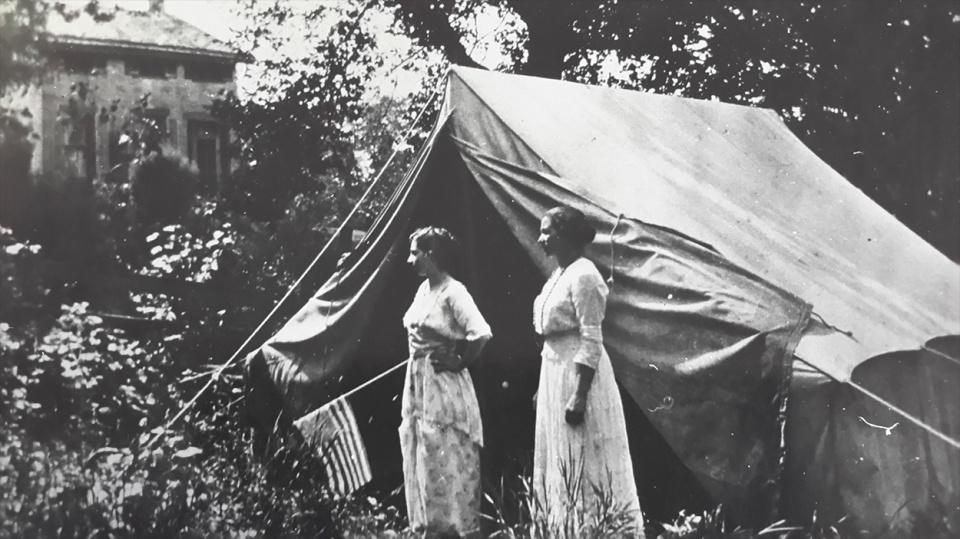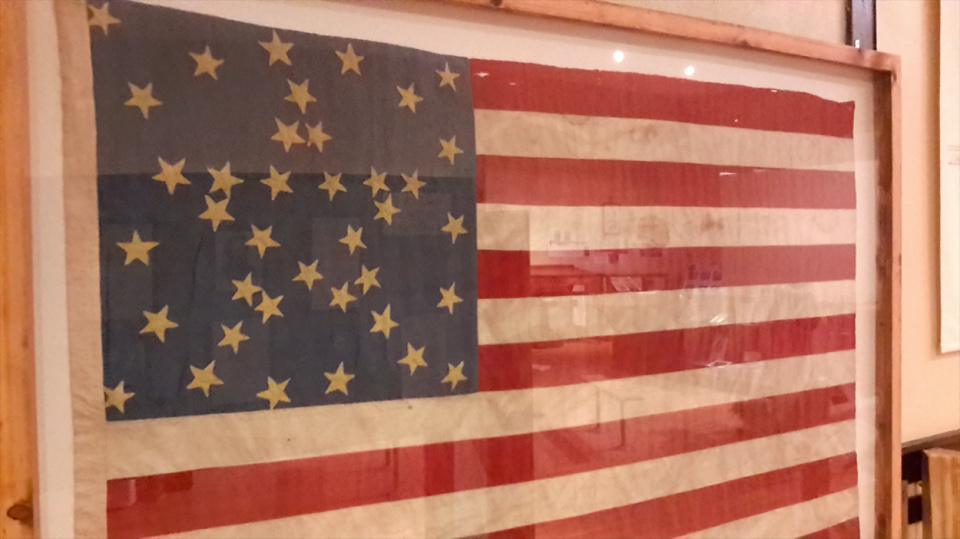Grant had been in Galena just a year when Fort Sumter in South Carolina was fired upon by Confederate artillery. These were the first shots of the Civil War. Immediately after Fort Sumter had fallen, Galena’s mayor, Robert Brand, called for a courthouse meeting where he proposed the formation of volunteer companies. After a heated discussion, the motion passed. The following evening, April 18, another meeting was held to enlist volunteers. Grant was introduced as a West Point graduate and a veteran of the Mexican War. He was asked to take charge of the recruiting, to organize a company, and to become its commander. Grant declined, stating he could not command a company because as an army officer, his services were beholden to the Government. He offered, however, to act as chairman, and to train volunteers until the government called him into service. A protest was voiced against Grant as chairman on the grounds that he had lived in St. Louis, a city of known secessionist sympathies. It was pointed out, that his wife was known to have owned two slaves. This protest was squashed by Congressman Elihu B. Washburne, and the following week Grant began training recruits, using the Washburne lawn as training ground. (This site will be pointed out on the East Side Tour.)
Galena was a prominent, proudly patriotic town of Middle America. In 1861, while Grant was training his troops, the women of Galena tailored uniforms for his soldiers and stitched together United States flags as shown in a photo on your screen.
Less than a month after Fort Sumter was fired upon, a company of 100 volunteers led by Galenian Augustus L. Chetlain left for Springfield, Illinois. They were dressed in home-tailored, blue frock coats and dark gray pants with blue cords. The company was escorted to the Galena train depot by the volunteer fire company, the German Benevolent Society, and a large group of citizens. Prior to their departure, a United States flag was proudly presented to the soldiers. However, when the company reached their camp, the government rejected the flag because of its “irregularities”. Apparently, the star arrangement was incorrect and the blue background was the wrong shade of blue. Fortunately, General John E. Smith knew how much this flag meant to Galena, so he kept it safe and returned it home. (A picture of the flag is shown on the screen)
Grant did not participate in the Galena depot ceremonies. He made his way to Springfield accompanied only by his battered luggage. His role was that of an advisor to the Galena Company. When Grant arrived in Springfield, Congressman Washburne, after whom the “Washburne Lead Mine Regiment” was named, introduced Grant to Governor Yates. Yates offered Grant the position of Adjutant Generalship of Illinois, and Grant accepted. In his new role, he was to help organize and equip the many regiments of Illinois Volunteers that were pouring into Springfield’s ‘Camp Yates’.
There are many accounts of Grant’s activities during the early weeks of the war. Perhaps the most telling can be found in the autobiography of Galena’s General Augustus L. Chetlain, then the original Captain of the Jo Daviess Guards. Chetlain roomed with Grant at Camp Yates during the first few days.
Chetlain stated that, while at the Adjutant General’s Office, he found Grant in a small, poorly-lit room copying into a book the orders that had been issued. Grant was depressed in spirits, and disappointed by his lack of success in obtaining a more suitable appointment. Grant said he was going to return to the Galena store the following day. Chetlain encouraged him to stay on, and that something more suitable would certainly be given to him. After talking the matter over, Grant agreed to stay a few more days.
Two days later Captain Pope, who had commanded Camp Yates while acting as mustering officer, returned to St. Louis. Governor Yates named Ulysses S. Grant to fill the vacancy as Camp Commander for the mustering-in activity.
Grant was confident that he could successfully manage a regiment. And according to Chetlain, Grant gave many valuable suggestions regarding supply and training while at Camp Yates. Chetlain attributed much of the early efficiency of his unit to advice given by Grant.
When his services as a mustering officer were no longer needed, Grant returned to Galena. Here, he was restless and felt humiliated as he was not serving during a time when there was such great need for experienced military men.
He took a train east, supposedly to visit his parents in Covington, Kentucky, but in reality to see if he could get a military appointment in his native state of Ohio. In Cincinnati, just across the river from Covington, Major General George B. McClellan was assembling Ohio volunteers.
Grant twice made the short trip from Covington to McClellan’s headquarters. He had known McClellan casually at West Point and also during the Mexican War. Grant hoped that he might find a place on McClellan’s staff, however on both occasions he was unable to even see McClellan.
In desperation he wrote the following letter to the War Department addressed to Col. L. Thomas, Adjt. General of U.S.A.
“Sir: Having served for 15 years in the regular army, including four years at West Point, and feeling it a duty of everyone who has been educated at the Governments expense to offer their services for the support of that Government, I have the honor, very respectfully, to tender my services, until the close of the war, in such capacity as may be offered. I would say, in view of my present age and length of service, I feel myself competent to command a regiment, if the President, in his judgment, should see fit to entrust one to me.
Since the first call of the President, I have been serving on the staff of the Governor of this state, rendering such aid as I could in the organization of our State Militia, and am still engaged in that capacity. A letter addressed to me at Springfield, Illinois will reach me.
I am very respectfully, U. S. Grant”
Grant never received a reply. Interestingly, after the Civil War had ended and Grant’s notoriety was established, there was an extensive search for this letter. Understandably, no one would admit to having seen it. However, sometime later, while packing up the Adjutant General’s Office, the letter was found. It had been misfiled.


